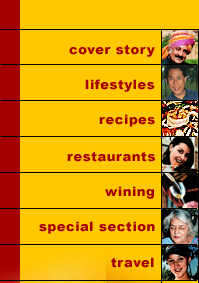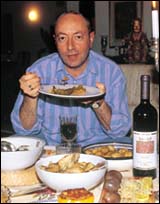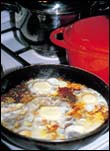



Israeli consul general DOV SEGEV-STEINBERG is a first class cook. When he has guests at home, he gets into the kitchen to cook them a Jewish kosher banquet. |
|
DOV Segev-Steinberg, the affable consul general of Israel in Bombay, uses the quick rewards of cooking as a compensation for the slower rewards that accrue from diplomacy. "In diplomacy," said Dov, when he invited UpperCrust into his 22nd floor kitchen at Kanchengunga on Peddar Road, "it takes a lot of effort and time before you see results, but in cooking, whatever you do, you see the results immediately. Besides, the kitchen has an important place at home and in life. Golda Meir, the great prime minister of Israel, used to conduct her entire cabinet from her kitchen at home!"
No doubt, Dov was thinking of the troubled Middle East peace initiative and the bloodshed in the Occupied Territories as Palestinians clashed with Israeli troops. For he paused, a faraway look in his light eyes, then picked up the conversation again. This residence of the Israel consul general in Bombay is very often the venue for banquets when heads of that state visit. I had wined and dined here several times before, with Dov Segev-Steinberg's predecessors. And I had enjoyed some fine Pinot Noirs and Gewurztraminers from the wineries in the Golan Heights, and a hotch-potch Jewish meal, but never one cooked exclusively for me and by the consul general himself.
That's what Dov was doing. And he now read out the menu. "Stuffed Peppers with Mincemeat and Rice, Baked Chicken with Mid-Eastern Spices and Potatoes, French Bean Soup, Israeli Salad, and Crepes Stuffed with White Cheese and Marmalade for dessert," he announced. "Sounds good?" To me it sounded great. And I said as much to the soft-spoken Jewish diplomat.
Dov grinned hugely, his face lighting up, and then got cracking. We were squeezed into his tiny kitchen, the consul general, myself and his two maids, Blossom and Greta. In a small passage outside the kitchen, taking in the late afternoon sun, was Dov's pomeranian and talking parrot. Everytime somebody opened the door into the passage, the dog would dart into the kitchen intrigued by the aromas of his master's cooking, and the parrot would reprimand him.
He is a methodical cook, this Dov Segev-Steinberg. And very obviously, he did the cooking at home often, for he knew where exactly things were in his kitchen. I watched him move about comfortably, adding tomato puree and chicken powder ("I use Maggi's") to bright red, yellow and green stuffed peppers, while slipping on mittens to check the chicken that was baking in a Panasonic oven.
On another burner, the soup bubbled, onions in oil, pepper, French beans, potato and fresh dil. "Plus a squeeze of lemon, a dash of sugar and salt, and it's done," said Dov. "In Israel, we add sour cream. But I don't get sour cream here." He suddenly decided to add a Shakshuka to the menu. "That sounds gibberish," he said cheerfully, "but it's a quickly-made dish, the favourite of Israeli bachelors and armymen. Chopped onions and tomatoes, you fry them in oil, add two chopped peppers, one green and one yellow, mix for one minute, throw in salt and pepper, pour eggs on top, cover and cook for 10 minutes." I almost expected him say to "Voila!"
He does most of his shopping at Crawford Market, and sometimes at Grand Road. Yes, Dov goes into the market himself, inspects the produce, and makes his selection only after being satisfied. The shop-keepers at both markets have come to recognise and respect this gentle Jew. Not only do they not try to fleece him anymore, they give him good bargains. "In Israel," said Dov, "on my way home from work, I go into these huge open markets that we have. They are called souks. What fresh fruit and vegetables we get there! They are a visual, culinary and aromatic feast of spices, herbs and foodstuffs. I walk in with a big bag. And on the spot, depending upon what's available, I decide the night's dinner menu. I make my purchases, go home, call friends over, and in two hours dinner is ready!"
He talked about his family. A mother in Tel Aviv, whom he called whenever he had a problem with some Jewish recipe. Like he had on Rosh Hashanah day, the Jewish New Year, when he set out to bake a traditional honey-based sponge cake with cloves, cinnamon, walnuts, raisins and lots of spices. "In Israel, I would have gone out and bought it from a bakery!" Mama Steinberg read out the family recipe from Tel Aviv, and 45 minutes later, Dov was offering his guests the cake.
His entire family was a set of talented cooks, Dov said. Grandmother (who had survived the holocaust with his parents), father, brothers, all enjoyed cooking. They loved to go into the kitchen, they had that curiosity to look, learn and absorb what was going on. Food was an important part of Jewish culture. "It is similar here in India," he said. "People enjoy food. It is not just a necessity. They discuss it all the time. Like India, Israel also has several restaurants. Cuisines from all over the world. They are great meeting places. People sit over food and talk."
The food was almost ready, and I mentioned to Dov that this would be my first fully kosher meal. Kosher is the culinary diet that Jews follow. Dairy products are not mixed with meats. And meats are slaughtered in a certain way. "Like your halal," he offered helpfully. Seafood and pork is forbidden. But drinking wine is fine. "Israel is a very Mediterranean country. We grow lots of grapes. Wine-making started here over 100 years ago. You heard of the famous winery Rothschild? Started here! We have a basic wine industry based on French techniques. And we grow the same variety of grapes as France and Italy. The last 15 years, a lot of American techniques have come in. Our wines now have international prices. And they are very good."
Indeed they are. For Dov had popped a bottle of semi-dry blush Zinfandel for our meal. He had laid out the table, and since it was evening, illuminated it with the traditional Jewish candelabra. Jews light this over eight days to celebrate Hanuka, the festival of lights, signifying Jewish victory over Greeks 2,300 years ago. Dov said, "Israel is a melting pot of cooking influences. It's food is Central East European food, a mishmash of several cultures, very hard to be specific, because Israel's population is made of immigrants from 80 nations.
The Israeli table is influenced by Syria, Iran, Iraq, Egypt, Tunisia, Algeria, Libya, Morocco, Turkey, Greece, Hungary, Poland, Romania, Russia, Ethiopia, Georgia, Yemen. There is bedouin food too, traditional Muslim, Christian holiday fare." I looked at the table, groaning under the weight of the food, and thought that it was a large meal two people. Reading my mind, Dov Segev-Steinberg said, "Don't worry. After you go, I have invited friends over for dinner. Just like in Tel Aviv. I cook, and they eat."
|

Home Page
About the mag
Subscribe
Advertise
Contact Us

